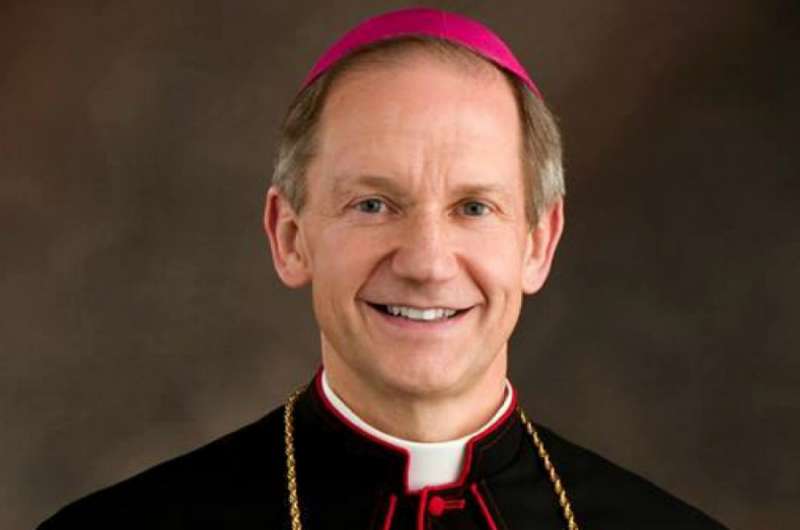The Bishop of Springfield, Illinois, has decreed that state legislative leaders may not be admitted to Holy Communion within his diocese, because of their work to pass the state Reproductive Health Act. The bishop also directed the Catholic legislators who have voted legislation promoting abortion should not present themselves to receive Holy Communion until they have first gone to confession.
“In accord with canon 915 of the Code of Canon Law...Illinois Senate President John Cullerton and Speaker of the House Michael J. Madigan, who facilitated the passage of the Act Concerning Abortion of 2017 (House Bill 40) as well as the Reproductive Health Act of 2019 (Senate Bill 25), are not to be admitted to Holy Communion in the Diocese of Springfield in Illinois because they have obstinately persisted in promoting the abominable crime and very grave sin of abortion as evidenced by the influence they exerted in their leadership roles and their repeated votes and obdurate public support for abortion rights over an extended period of time,” Bishop Thomas Paprocki wrote in a June 2 decree.
“These persons may be readmitted to Holy Communion only after they have truly repented these grave sins and furthermore have made suitable reparation for damages and scandal, or at least have seriously promised to do so, as determined in my judgment or in the judgment of their diocesan bishop in consultation with me or my successor,” the bishop added.
Illinois’ Reproductive Health Act was passed by the state’s House and Senate just days ago, and observers credited the advocacy of Cullerton and Madigan with helping to secure passage. It is expected to be signed by Illinois’ Gov. J.B. Pritzker.
The bill declares abortion to be a “fundamental right” in the state and would remove regulations on abortion clinics and doctors.
Among the provisions that the bill would remove are regulations for abortion clinics, required waiting periods to obtain an abortion, and a ban on partial-birth abortion. In addition, it would lift criminal penalties for performing abortions and would prevent any further state regulation of abortion.
The legislation would require all private health insurance plans to cover elective abortions, and eliminate reporting requirements as well as regulations requiring the investigation of maternal deaths due to abortion.
Paprocki’s decree formally instructs priests and deacons in the Diocese of Springfield to refrain from administering the sacrament of the Eucharist to Cullerton and Madigan, both Catholics. The bishop also instructed other Catholic lawmakers not to approach Holy Communion, but did prohibit priests from administering the sacrament to them.
“I declare that Catholic legislators of the Illinois General Assembly who have cooperated in evil and committed grave sin by voting for any legislation that promotes abortion are not to present themselves to receive Holy Communion without first being reconciled to Christ and the Church in accord with canon 916 of the Code of Canon Law,” Paprocki wrote.
In a statement issued June 6, the bishop said that “in issuing this decree, I anticipate that some will point out the Church’s own failings with regard to the abuse of children.”
“The same justifiable anger we feel toward the abuse of innocent children, however, should prompt an outcry of resistance against legalizing the murder of innocent children. The failings of the Church do not change the objective reality that the murder of a defenseless baby is an utterly evil act.
“We also understand many unplanned pregnancies come with fear and difficulty,” Paprocki acknowledged.
“It is our obligation, as a society, to be there for these pregnant mothers, help them in any way possible, and empower them to make life affirming decisions. This also includes continued support for the mother and her child after birth. We must acknowledge a child in the womb is not a problem. He or she is a gift from God.”
The bishop’s decree comes five months after a controversy surrounding New York’s Catholic governor Andrew Cuomo, who in January signed into law a bill that also dramatically expanded legal protection for abortion.
While some Catholics called for New York’s Cardinal Timothy Dolan to excommunicate Cuomo - a canonical option most experts said was not technically possible - others encouraged the cardinal to formally prohibit Cuomo from receiving Holy Communion.
Although Dolan criticized Cuomo’s decision, he stopped short of issuing a decree prohibiting Cuomo from the Eucharist. The cardinal told reporters that decision would be counterproductive.
For his part, Paprocki said that he issued the decree to encourage conversion.
“In view of their gravely immoral action to deprive unborn children legal protection against abortion, it must be said that any Catholic legislator who sponsored, promoted, advocated, or voted for these pro-abortion bills has acted in a seriously sinful manner unfaithful to the 2,000-year-old Christian teaching against abortion and therefore, would place themselves outside of the full communion of the Catholic Church,” the bishop said.
“Such persons are not to receive Holy Communion until they have celebrated the sacrament of reconciliation and displayed a public conversion of life.”
“As sacred Scripture warns, ‘Whoever eats unworthily of the bread and drinks from the Lord’s cup makes himself guilty of profaning the body and of the blood of the Lord.’ To support legislation that treats babies in the womb like property, allowing for their destruction for any reason at any time, is evil. It’s my hope and prayer these lawmakers reconcile themselves to the Church so they can receive Communion.”
“The Eucharist is the most sacred aspect of our Catholic faith,” Paprocki added.
In 2018, Paprocki said that Illinois Senator Dick Durbin would not be admitted to Holy Communion because of his advocacy for the legal protection of abortion.
Paprocki’s statement recognized the Illinois lawmakers who had opposed the Reproductive Health Act.
“I want to thank lawmakers who stood up to these barbaric pieces of legislation and voted ‘no,’ and I applaud their courage to speak the truth that the most basic right we should all enjoy, is the right to life.”

